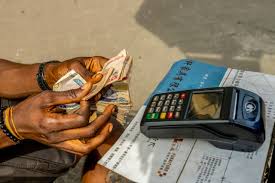THE scarcity of cash in Nigerian banks has again resurfaced as a crisis, disrupting the daily lives of millions and exposing the weaknesses of a cash-dependent economy. Across the country, individuals seeking to withdraw money from banks are faced with long queues, strict cash withdrawal limits and malfunctioning or understocked ATMs. This has created chaos, leaving citizens desperate and turning to Point-of-Sale (POS) operators, who have taken advantage of the situation by charging exorbitant commission to provide access to cash.
Initially introduced as a convenient alternative to bank queues, POS operators have now morphed into agents of exploitation. These operators often acquire cash in bulk from banks willing to sell it at a premium and resell it at steep charges to desperate customers. Their stands now litter every street corner, and as indispensable as their services are to people, they constitute an inevitable burden. Their transaction fees, sometimes as high as 10% of the withdrawn amount, have become increasingly unaffordable, particularly for low-income earners. It’s a cause for concern that Nigerians seeking to access their own money are compelled to pay a somewhat penalty.
Among other factors, the naira redesign policy of the Muhammadu Buhari administration in 2023 is a major cause. The policy aimed at curbing corruption by mopping up liquidity of the economy as well as encouraging a transition to cashless transactions. However, it was poorly executed hence the widespread cash shortages it created in the long run. The old currency notes were withdrawn faster than the scantily distributed new ones, leaving individuals stranded and businesses worse hit. As unnecessary as the naira redesign was, the lack of proper planning generated disastrous consequences which imperilled the economy and pushed millions of Nigerians into a crisis they never bargained for.
However, Nigeria’s overwhelming dependence on cash reflects its status as a developing economy. The informal sector, which drives much of the country’s economic activities, relies heavily on daily cash transactions. For traders, artisans, farmers, and transport operators that constitute this sector, cash is not just a preference but a necessity. While efforts to shift towards a cashless society are ongoing, they are hindered by challenges such as poor network reliability, inadequate digital infrastructure, and limited access to banking services, particularly in rural areas. For many Nigerians, digital payment platforms are simply not a viable alternative.
To address this crisis, the Central Bank of Nigeria (CBN) should take swift and decisive action. An immediate step is to regulate the behavior of money deposit banks (MDBs) by ensuring that they make cash available to individual customers rather than prioritize bulk sales to POS operators. The recent announcement of imposing fine on the MDBs to stem the prevalence of such unethical practice is a step in the right direction. Additionally, the CBN should ensure that ATMs are consistently stocked and always operational, reducing the over-reliance on POS services. It is also important to enforce a cap on POS transaction charges to prevent consumers from being exploited during cash shortages.
In the long term, it is crucial to strengthen Nigeria’s digital payment infrastructure to make cashless transactions more accessible and reliable. Expanding network coverage, improving internet reliability, and educating the public on the usage of digital financial tools are imperative.
However, the transition to a cashless economy should be gradual and inclusive, taking into account the needs of rural communities and the informal sector. Cash will continue to play a significant role in Nigeria’s economy for the foreseeable future, and its availability must be guaranteed.
The prevalence of POS operators and their exploitative charges is not just a reflection of their business practices but a symptom of deeper systemic issues in Nigeria’s financial sector. The country’s economic development depends on a financial system that is fair, accessible, and well-regulated. Resolving the current cash crisis requires a multifaceted approach that combines immediate regulatory reforms with long-term infrastructural investments.
As Nigeria works towards building a stronger and more inclusive economy, restoring access to cash and addressing predatory practices must remain at the forefront.


